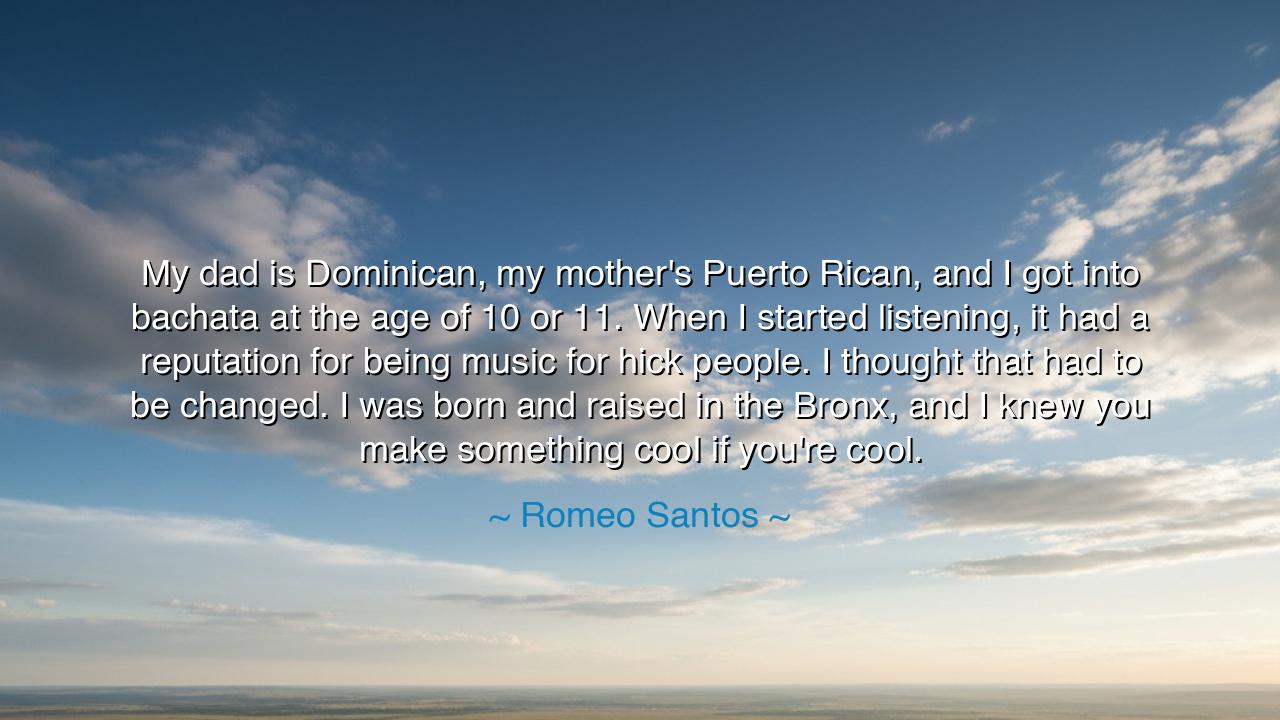
My dad is Dominican, my mother's Puerto Rican, and I got into
My dad is Dominican, my mother's Puerto Rican, and I got into bachata at the age of 10 or 11. When I started listening, it had a reputation for being music for hick people. I thought that had to be changed. I was born and raised in the Bronx, and I knew you make something cool if you're cool.






"My dad is Dominican, my mother's Puerto Rican, and I got into bachata at the age of 10 or 11. When I started listening, it had a reputation for being music for hick people. I thought that had to be changed. I was born and raised in the Bronx, and I knew you make something cool if you're cool." — thus spoke Romeo Santos, the “King of Bachata,” whose words echo with the rhythm of pride, identity, and transformation. In this reflection, Santos reveals not only the story of his musical journey but a deeper truth about the power of self-belief, cultural redemption, and the courage to reimagine what the world has dismissed. His quote is not merely about music — it is about the human spirit’s power to elevate the ordinary, to turn ridicule into reverence, and to make the world see beauty where it once saw only scorn.
In the style of the ancients, one might say: to uplift one’s roots is the noblest form of creation, for it redeems not only the self but the people who gave it birth. Romeo Santos, born in the melting heart of the Bronx, stood at the crossroads of two worlds — the rhythm of the Caribbean and the pulse of the American city. His Dominican and Puerto Rican heritage was a song of both pride and struggle. The genre that shaped his childhood, bachata, was long dismissed as rustic, unsophisticated — “music for hick people,” as he said. Yet Santos, even as a child, saw through the fog of prejudice. He knew that the worth of art is not in its label, but in its soul, and that the artist’s task is not to escape his heritage, but to transform it.
Thus began his journey — not just to fame, but to reclamation. He did not reject the humble origins of bachata; he crowned them. He took what others mocked and made it shine. Like the ancient craftsman who forges gold from base metal, Santos refined the music of his people through his vision, fusing its old tenderness with modern flair, its rural heart with urban confidence. When he said, “I knew you make something cool if you’re cool,” he was not speaking of arrogance, but of mastery — the power to redefine perception through excellence. True coolness, he teaches, is authenticity polished by courage.
History remembers such transformations. Think of Louis Armstrong, who took the rough sounds of early jazz — born in the streets and brothels of New Orleans — and carried them into the halls of the world’s elite. Like Romeo Santos, Armstrong faced those who called his music vulgar or low, yet through artistry and conviction, he transformed it into a symbol of genius and joy. Both men shared the same alchemy: the ability to see value where others saw shame, and to make their art a mirror of dignity for their people. Theirs was not rebellion for vanity’s sake, but the sacred act of reclaiming identity and pride.
Romeo’s quote also carries the wisdom of self-awareness — that one’s worth is not granted by society, but revealed through action. “If you’re cool,” he said, “you make something cool.” In other words, greatness is not found in imitation but in confidence. The artist, like the hero, must believe in his own power before the world does. By believing in bachata — in its warmth, its melancholy, its pulse — Santos taught others to believe in it too. This is how cultural revolutions begin: not through force, but through the quiet conviction of one who refuses to bow to shame.
The lesson, then, is both simple and eternal: honor where you come from, and let no one define its worth but you. Every tradition, every humble beginning, holds within it the seed of greatness — if one dares to see it. Do not run from your roots; cultivate them. If the world calls your heritage small, prove it vast. If it calls it old-fashioned, make it timeless. For what you elevate with love and vision, no insult can diminish. Romeo Santos reminds us that transformation begins not in the world’s perception, but in the artist’s heart — in the decision to stand tall and say, “This is mine, and it is beautiful.”
And so, my child, remember this truth: the world may laugh at your beginnings, but it cannot laugh at your mastery. Bachata, once ridiculed, now fills stadiums; the Bronx boy who loved it became its king. Let that be your guide — whatever your craft, your passion, your heritage, embrace it wholly. For as Romeo Santos has shown, when you move through life with authenticity and pride, you do not merely make things cool — you make them immortal.






AAdministratorAdministrator
Welcome, honored guests. Please leave a comment, we will respond soon